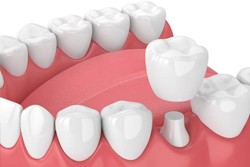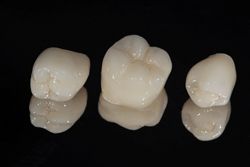Dental Crowns – Plano, TX
Strengthen and Restore Damaged Teeth
 Dental crowns in Plano have been a staple in dentistry for many years.
This restorative treatment often has the power to save a damaged tooth from
extraction and bring back its function and beauty. Dr. Shannon Stokes has
years of experience in designing and placing crowns and would be glad to
help you take advantage of this treatment. If you suspect you need a crown,
contact our office soon to
request an appointment.
Dental crowns in Plano have been a staple in dentistry for many years.
This restorative treatment often has the power to save a damaged tooth from
extraction and bring back its function and beauty. Dr. Shannon Stokes has
years of experience in designing and placing crowns and would be glad to
help you take advantage of this treatment. If you suspect you need a crown,
contact our office soon to
request an appointment.
What Are Dental Crowns?
 Dental crowns are custom-made caps that get placed over the entire visible
portion of a tooth. They therefore serve to protect a weakened tooth from
food, temperature changes, and other environmental factors that might cause
it further harm. It used to be standard practice for crowns to be made out
of metals such as gold and silver, but nowadays many dentists and patients
alike prefer metal-free options.
Dental crowns are custom-made caps that get placed over the entire visible
portion of a tooth. They therefore serve to protect a weakened tooth from
food, temperature changes, and other environmental factors that might cause
it further harm. It used to be standard practice for crowns to be made out
of metals such as gold and silver, but nowadays many dentists and patients
alike prefer metal-free options.
Why Are Metal-Free Dental Crowns Important?
Although metal crowns are sturdy and have the potential to last for a long time, their obvious downside is that they’re not very attractive. Metals clash with the color of the teeth around them, resulting in a smile that falls short of its aesthetic potential.
A porcelain, metal-free crown can be matched to the color of your natural teeth. When one is properly constructed and placed by an experienced cosmetic dentist in Plano, your restored tooth will fit in in seamlessly with its surroundings.
Why Would You Need a Dental Crown?
Some common reasons why you may need a dental crown include:
- You recently had a root canal.
- A tooth suffered severe decay or damage.
- A tooth is badly misshapen or has other serious aesthetic flaws that you wish to disguise.
- One of your teeth is severely worn down.
- You suffer from cracked tooth syndrome.
- You have an old crown that feels loose or uncomfortable.
The Process for Dental Crowns
 Generally, it takes just two appointments for Dr. Stokes to place a dental
crown. At the first appointment, he will prepare your tooth. He may need to
file it down or fill it in so it fits well under your new restoration. Then,
he’ll take some impressions of your mouth. You’ll wear a
temporary crown as you wait for a laboratory to create your custom crown.
When it is ready, you’ll return to our office so Dr. Stokes can
permanently place it in your mouth.
Generally, it takes just two appointments for Dr. Stokes to place a dental
crown. At the first appointment, he will prepare your tooth. He may need to
file it down or fill it in so it fits well under your new restoration. Then,
he’ll take some impressions of your mouth. You’ll wear a
temporary crown as you wait for a laboratory to create your custom crown.
When it is ready, you’ll return to our office so Dr. Stokes can
permanently place it in your mouth.
What to Expect After You Receive a Crown
The area around the crown may be sensitive of swollen for a few days after you receive your crown. However, such symptoms should go away relatively quickly. Avoiding hot and cold foods and taking mild painkillers should help you manage the discomfort. Once you’ve recovered, you’ll be able to go back to your normal eating routine.
How to Care for Your Crown
 To keep your porcelain crown in the best shape possible, you should:
To keep your porcelain crown in the best shape possible, you should:
- Stick to a good oral hygiene routine that includes daily flossing and twice-daily brushing.
- Don’t bite on extremely hard foods. Although porcelain is tough, it can become chipped.
- Call our office if your crown ever feels loose or otherwise damaged.
- If you habitually grind your teeth at night or play sports, wear proper mouth protection (a nightguard or a sports guard).
How Long Do Crowns Last?
A porcelain crown may last for 10 – 15 years if you care for it properly. Many patients find that their crowns last even longer than that.
Understanding the Cost of Dental Crowns

It’s natural to have questions about restorative procedures like dental crowns. One of the first things many patients want to know is how much they cost. A few variables can impact the amount you can expect to pay out of pocket, so we’ll provide an accurate estimate once you’ve had your initial consultation with Dr. Stokes. Then, you’ll have a chance to review his recommendations before making the final decision to move forward.
Factors That Affect the Cost of Dental Crowns

There’s no one-size-fits-all pricing structure for restorations like dental crowns, so it’s important to understand what determines the quoted amount. Some things that influence the final amount include:
- The purpose of your dental crown. These caps are used in different instances, like to cover a damaged tooth that has undergone a root canal, or to cover a dental implant. Additional procedures add to the total owed.
- Where it is located. If your dentist is working with your front teeth, they’re relatively easy to access. Treating molars in the back of your mouth requires additional time and effort which can drive up the rate.
- The materials used. This type of restoration can be made of metal, porcelain, or composite resin and the different materials can impact the price.
- How it will be created. Depending on the technology your dentist uses, they’ll either have your restoration created at a lab, or onsite using CEREC technology which can be more expensive.
Does Dental Insurance Cover Dental Crowns?

Dental crowns are considered a major procedure that restores functionality to your damaged teeth, so typically, insurance companies cover about 50% of the total fee. However, not all plans are the same so you should check with your provider to verify what’s included. If you have a hard time finding that information, our friendly staff are more than happy to assist you. They’re familiar with many different policies and can help you make the most of your benefits.
Options for Making Dental Crowns Affordable

If you’re worried that you can’t get dental crowns because you don’t have an insurance policy, you can set your concerns aside. We believe that your budget shouldn’t interfere with getting the dental care that you need. As a result, our office has partnered with a third-party financer to offer CareCredit. This service allows you to break up your payment into more manageable installations over a designated period.
If you have additional questions or would like more information, feel free to contact us and our team would be more than happy to assist you.
Dental Crown FAQs

Getting a dental crown is a process that typically involves multiple visits and making alterations to your tooth. You’re likely to have several questions beforehand, and Dr. Stokes is here to help! Feel free to bring up any concerns you have during your first visit so that we can help address them. Here are some of the most common questions that patients have.
What is the Difference Between a Temporary Crown and a Permanent Crown?
As the name suggests, a temporary crown is only used to protect your tooth until your permanent crown is ready. It can take several days or weeks for a crown to be made, which is why a temporary restoration is typically necessary. A temporary crown is often made from acrylic or stainless steel and is generally less durable than a permanent crown; while wearing it, you’ll need to avoid chewing with that side of your mouth. (Similarly, you shouldn’t eat anything sticky or chewy that might pull the crown off.)
Can You Still Get Cavities While You Have a Crown?
Even though a crown covers your tooth, it can’t be used to prevent cavities. Bacteria and food particles can still slip under the restoration and attack what’s left of the enamel underneath. This is why you need to keep brushing and flossing your crown as if it were a natural tooth. Furthermore, you should pay close attention to the gum line near the crown when brushing. If the soft tissues in your mouth become infected (a condition called gum disease), it could very easily lead to tooth loss.
Will Dental Insurance Pay for a Crown?
As long as you’re getting a crown as part of a necessary treatment for your oral health (such as to protect a badly decayed tooth), you’re likely to receive some level of coverage from your dental insurance. Most plans will classify placing a crown as a major procedure and will cover about 50% of the cost. Of course, this may be different depending on what carrier you have. We’re happy to help make sure that you get the benefits you’re entitled to from your policy; we also work with CareCredit if you don’t have insurance and need help paying for care.
Will It Hurt to Get a Crown?
Some modifications will need to be made to your tooth before the crown is placed. You will be numb during this process, although you might experience some achiness once it wears off. The actual placement of the crown should cause little to no pain. You might feel some discomfort when the temporary crown is removed, which is due to air hitting the exposed nerves; this feeling will only last for about a minute. (In fact, if you’re getting a crown after root canal therapy, you won’t feel anything at all because the nerves will already be gone.) Of course, you will typically experience some minor discomfort and swelling for a few days afterwards, but any pain you feel during this period can easily be controlled with medication.
Can Dental Crowns Be Whitened?
Dental crowns cannot be whitened in the same way that natural tooth enamel is. This is because tooth enamel has tiny pores through which bleaching gels can enter and break apart stains, but dental restorations, like crowns, do not. Therefore, your crown should remain the same color. If you are unhappy with the color of one of your existing crowns, let us know. We may be able to replace it with a new one that better suits the shade of your smile.
What Happens If You Wait Too Long to Get a Dental Crown?
Dentists will only ever recommend that you get a dental crown if you really need one. You might feel tempted to put off the procedure, but it is best to schedule it immediately if your dentist has suggested it. Waiting too long to get a crown leaves the tooth exposed to chewing forces, food debris, and bacteria, ultimately causing the decay or damage to worsen. If you wait too long, you could end up requiring root canal treatment or an extraction. Generally speaking, it is best to get your dental crown as soon as you can after it is recommended.
What Can I Eat with a Temporary Crown?
You should be able to chew like normal when you have a temporary crown. However, it is best to avoid certain foods until your permanent one is placed for several reasons. There might be a small gap between your temporary crown and gumline, so it’s best to limit sugary foods and drinks. Very hot and cold food can result in sensitivity. You should also avoid hard and sticky foods as they can damage, loosen, or dislodge the crown. This includes popcorn, nuts, hard bread, and hard candy.
Is It a Dental Emergency If Your Crown Falls Off?
Losing a dental crown isn’t an urgent dental emergency, but you should still contact your dentist and schedule an appointment within a few days. If the underlying tooth has sharp edges that could irritate or cut the soft tissue of the mouth, you should come in as soon as you can. Until your visit, put a piece of orthodontic wax over the tooth for protection. Try to avoid chewing with that tooth until your appointment. Bring your crown with you to the dental office. Depending on its condition, they may be able to rebond it to your tooth.









